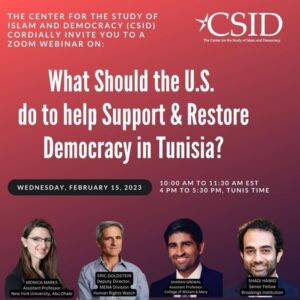
Credit: POMED
Democratization is not ‘the only game in town’. As a moral imperative, in Tunisia it competes with the right to have socio-economic rights, say analysts Larbi Sadiki and Layla Saleh.
The balance of power has now tipped too much in favor of President Kais Saied for dialogue to be a tool for reconciling the country. To clear the ‘bottleneck’, Saied could free all prisoners unconditionally. With diverse interlocutors from within the polity, civil society and the academy, the president could plan a road map that is inclusive, they write for Eurozine:
 The 2015 Nobel Quartet has the skills should he go this way. By leading broad consultations involving the impoverished regions and even his opponents, Saied would demonstrate the political will for a national vision of sustainable democracy, economy, social justice and equal development. ….European leaders (from Italy, the Netherlands and the EU) have promised over a billion euros in assistance, likely tied to a new IMF deal in the works. Controversially, much of the aid appears geared at combating migration to Europe. The joint statement in June 2023 announcing this new ‘partnership’ did not mention democracy.
The 2015 Nobel Quartet has the skills should he go this way. By leading broad consultations involving the impoverished regions and even his opponents, Saied would demonstrate the political will for a national vision of sustainable democracy, economy, social justice and equal development. ….European leaders (from Italy, the Netherlands and the EU) have promised over a billion euros in assistance, likely tied to a new IMF deal in the works. Controversially, much of the aid appears geared at combating migration to Europe. The joint statement in June 2023 announcing this new ‘partnership’ did not mention democracy.
On the other hand, a new bill proposed by two US Senators (see below – HT POMED) seeks to condition American aid on democratic restoration and reforms, Sadiki and Saleh add. Given these developments, the world’s main democracy promoters must also appreciate the specificities of the region’s democratic transitions.
In a new POMED Expert Q&A with Zachary White, Tunisian journalist Amine Snoussi discusses this cyber-harassment of Saïed’s critics and how Tunisia’s government is participating in the digital crackdown. POMED also offers policy recommendations for the U.S. government and social media companies to respond to this growing threat to rights and freedoms in Tunisia. Read it here.
Senators Menendez (@SFRCdems) & Risch (@SenateForeign) introduced the Safeguarding Tunisian Democracy Act to limit aid to Tunisia until the government “restores checks & balances” – https://t.co/x815fAIQEP pic.twitter.com/1S8WpUyI4M
— POMED (@POMED) June 20, 2023







